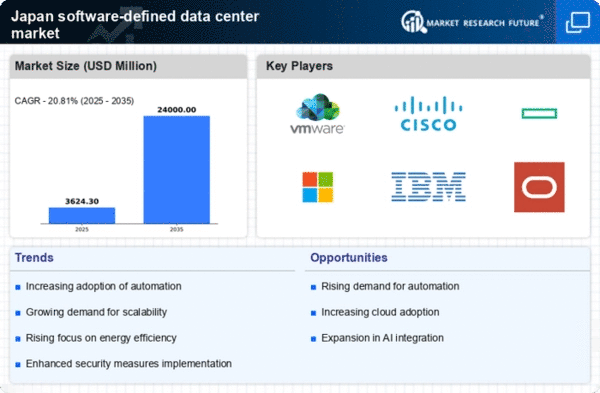Increased Focus on Data Security
In the context of the software defined-data-center market, the emphasis on data security is intensifying in Japan. With the rise of cyber threats and data breaches, organizations are prioritizing the implementation of robust security measures within their data centers. This trend is reflected in the increasing investments in security solutions, which are expected to reach $3 billion by 2026. The software defined-data-center market plays a crucial role in this landscape, as it enables organizations to deploy advanced security protocols and real-time monitoring systems. By leveraging software-defined technologies, businesses can enhance their security posture, ensuring compliance with stringent regulations and protecting sensitive information from potential threats.
Rising Demand for Cloud Services
The software defined-data-center market in Japan is experiencing a notable surge in demand for cloud services. As businesses increasingly migrate to cloud-based solutions, the need for flexible and scalable infrastructure becomes paramount. This shift is driven by the desire for enhanced operational efficiency and cost reduction. According to recent data, the cloud services market in Japan is projected to grow at a CAGR of approximately 15% over the next five years. This growth directly influences the software defined-data-center market, as organizations seek to leverage software-defined technologies to optimize their cloud environments. The integration of these technologies allows for improved resource allocation and management, ultimately leading to better service delivery and customer satisfaction.
Emergence of Edge Computing Solutions
The emergence of edge computing solutions is reshaping the software defined-data-center market in Japan. As the demand for real-time data processing and low-latency applications increases, organizations are exploring edge computing as a viable strategy. This trend is particularly relevant for industries such as manufacturing and telecommunications, where immediate data analysis is crucial. The software defined-data-center market supports this shift by enabling the deployment of edge computing architectures that integrate seamlessly with existing data center infrastructures. By leveraging software-defined technologies, businesses can optimize their operations and enhance their service offerings, ultimately driving growth and innovation in the market.
Growing Need for Disaster Recovery Solutions
The software defined-data-center market in Japan is witnessing a growing need for effective disaster recovery solutions. As businesses become more reliant on digital infrastructure, the potential impact of data loss or downtime has become a critical concern. Organizations are increasingly adopting software-defined disaster recovery solutions to ensure business continuity and minimize operational disruptions. Recent statistics indicate that nearly 60% of Japanese companies have experienced some form of data loss in the past year, underscoring the urgency for reliable recovery strategies. The software defined-data-center market addresses this need by providing scalable and automated recovery options, allowing businesses to restore operations swiftly and efficiently in the event of a disaster.
Advancements in Network Function Virtualization
Advancements in network function virtualization (NFV) are significantly influencing the software defined-data-center market in Japan. NFV allows for the decoupling of network functions from hardware, enabling greater flexibility and scalability in data center operations. This technological evolution is particularly relevant as organizations seek to enhance their network performance and reduce operational costs. The software defined-data-center market benefits from these advancements, as they facilitate the deployment of virtualized network services that can be easily managed and scaled according to demand. As a result, businesses can achieve improved agility and responsiveness in their IT environments, positioning themselves competitively in the market.

















